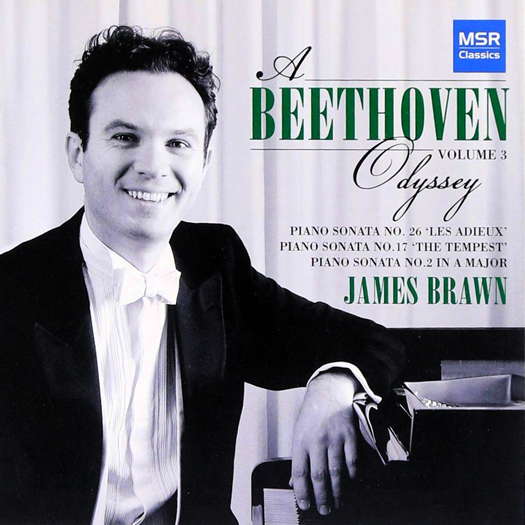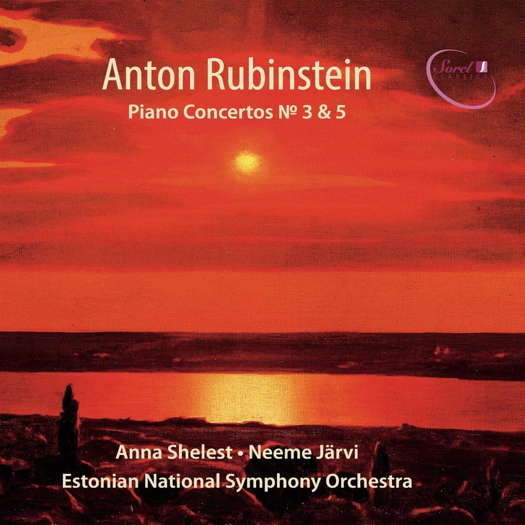- Luxemburg
- Jeanne Bamberger
- Lee Hoiby
- Muzio Clementi
- dance
- Vincenzo Bellini
- Blue Griffin Recording
- WNYC
 DISCUSSION: What is a work? John Dante Prevedini leads a discussion about The performing artist as co-creator, including contributions from Halida Dinova, Yekaterina Lebedeva, Béla Hartmann, David Arditti and Stephen Francis Vasta.
DISCUSSION: What is a work? John Dante Prevedini leads a discussion about The performing artist as co-creator, including contributions from Halida Dinova, Yekaterina Lebedeva, Béla Hartmann, David Arditti and Stephen Francis Vasta.
 SPONSORED: CD Spotlight. Masterful Handling - Volume 3 of James Brawn's Beethoven, praised by Andrew Schartmann.
SPONSORED: CD Spotlight. Masterful Handling - Volume 3 of James Brawn's Beethoven, praised by Andrew Schartmann.
All sponsored features >>

Heavy Going
Anton Rubinstein piano concertos Nos 3 and 5, heard by STEPHEN FRANCIS VASTA
'Anna Shelest does what she can with the material - her big chords are resonant, and her sparkling arpeggios delightful ...'
I've never really warmed up to Anton Rubinstein's piano concerti, though I keep trying, at least when review opportunities present themselves. The man may have been Tchaikovsky's composition teacher, but it's hard to fathom what the teacher could have taught the pupil. Rubinstein had a fair-to-middling melodic gift - nothing like his student's - and, frankly, a fair-to-poor sense of form. This makes the music heavy going, no matter who's playing it.
The Third Concerto is practically a compendium of the problems. The first movement opens with beautiful warm string phrases, answered by sparkling if unimaginative piano arpeggios.
Listen — Anton Rubinstein: Moderato assai (Piano Concerto No 3)
(SC CD 014 track 1, 0:00-0:45):
After a bit of this back-and-forth, those themes never return: a nice oboe solo is followed by a simpler, lighter second theme in the minor. You see what's happening: the movement feints at a structure, but keeps going off in different directions: you end up with no coherent structure at all. I kept waiting for the good stuff to start, and it never did, so the movement, paradoxically, actually feels 'too short'!
The Andante, generated from endless repetitions of a brief motif; quickly becomes short-winded and tedious.
Listen — Anton Rubinstein: Andante (Piano Concerto No 3)
(SC CD 014 track 2, 0:00-0:48):
The finale starts a bit better, with stormy orchestral gestures answered by the piano's proud chorale; the coda is reasonably crisp and compact, but, again, bears no relation to anything that's preceded.
The Fifth Concerto is rather better, though it's still not entirely convincing. The long, nineteen-minute first movement, like its analogue in the Third, suffers from a surfeit of unrelated material, though it's better material. In spots, this or that theme will feel like an important arrival; thus, after the strings' turbulent whirling figure at the start and a bit too much impressive pianistic padding, the orchestra intones what feels like the real first theme, answered by the piano.
Listen — Anton Rubinstein: Allegro moderato (Piano Concerto No 5)
(SC CD 014 track 4, 1:22-2:18):
Later on, the orchestral triplets are so much padding, and a turbulent patch seems unmotivated. The lovely, yearning theme introduced at 14:37 promises much, but, again, never really comes into play.
Listen — Anton Rubinstein: Allegro moderato (Piano Concerto No 5)
(SC CD 014 track 4, 14:24-15:18):
The Moderato's 'baby marziale' threatens to wear out its welcome, but Rubinstein provides just enough variety of color and texture to bring it off.
The finale's opening hunting-horn fanfare is a nice idea, though the pianist belabors it - it's better in the orchestra.
Listen — Anton Rubinstein: Allegro non troppo (Piano Concerto No 5)
(SC CD 014 track 6, 0:00-0:58):
There's a nice alla breve second theme, though it never dovetails quite smoothly with the fanfare. A vaguely Celtic theme is more in keeping with the music's spirit.
Listen — Anton Rubinstein: Allegro non troppo (Piano Concerto No 5)
(SC CD 014 track 6, 9:23-10:04):
There's too much of the coda.
Anna Shelest does what she can with the material - her big chords are resonant, and her sparkling arpeggios delightful - though she can't supply either inspiration or variety where the composer didn't. At the podium, Neeme Järvi's general musicianship is evident, but he doesn't bring any particular sense of texture or colour to the job. He actually begins to lumber in the Third Concerto's extended 'development', and much of that score is overresonant and opaque. Then again, even some of Shelest's playing seems to 'bunch up' in the lower-midrange, so perhaps the engineers - and the composer - are to blame.
Copyright © 22 June 2023
Stephen Francis Vasta,
New York, USA



